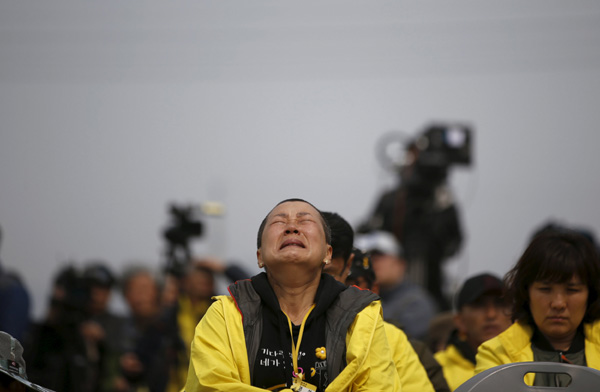Ferry victims' families pay tribute
On eve of anniversary, relatives cast flowers onto the sea where capsized ship claimed 304 lives
More than 100 relatives of victims of South Korea's Sewol ferry disaster tearfully cast flowers into the sea on Wednesday at an emotional memorial event on the eve of the tragedy's anniversary.
In bright sunshine and on a calm sea, the relatives were taken by boat to the large yellow buoy that marks the site where the ferry sank on April 16 last year with the loss of 304 lives - most of them high school students.
|
 A mother of a victim who was aboard the sunken ferry Sewol cries at a memorial ceremony ahead of the first anniversary of the disaster in Jindo, South Korea, on Wednesday. Kim Hong-ji / Reuters |
"I am so heartbroken. In such cold water, to think how cold she would have been," Lee Jung-seob said of her daughter, Hye-kyung, one of 250 pupils at the Danwon High School in Ansan, an industrial city on outskirts of Seoul, who died.
"As she ended her life, to think how she would have missed her mum and dad and her family. My heart aches so much."
Lying on the seabed 40 meters below, the sunken ferry remains a highly sensitive topic of debate a year later - not least over the question of whether it should be raised to the surface.
Victims' families have threatened to boycott a semiofficial memorial service on Thursday unless the government makes an immediate commitment to salvaging the 6,825-metric-ton Sewol - an operation that would cost an estimated $110 million.
The relatives also continue to stage regular protests calling for a fully independent inquiry into the sinking, arguing that a committee created to investigate the causes has been compromised by the inclusion of government officials in key posts.
The accident - which plunged the whole nation into months of intense mourning - was largely blamed on the ship's illegal redesign and overloading.
But it also laid bare deeper-rooted problems of corruption, lax safety standards and regulatory failings attributed to the country's relentless push for economic growth.
The overloaded Sewol was carrying 476 people, including 325 students, when it sank.
Only 75 students survived.
The emergency response to the disaster was widely criticized for being slow, uncoordinated and unfocused, and prompted President Park Geun-hye to vow a complete overhaul of national safety standards.
Experts believe it will be decades before any major shift is seen in widespread attitudes that make safety subservient to economic progress and convenience. Already there's growing fatigue and frustration among citizens who see their government sliding back to business as usual, and a lack of accountability at high levels.
The government blamed the country's deadliest maritime disaster in decades on overloaded, poorly secured cargo and a botched rescue. But South Korea is divided over who is responsible, and a planned investigation by a special committee has stalled amid wrangling over money and personnel.
Thursday's main anniversary event is to be a gathering of families and officials at the memorial set up for the students in Ansan.
AFP - Reuters - AP


















